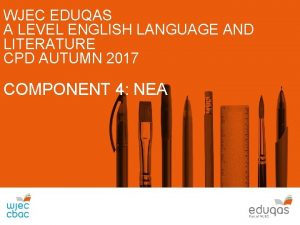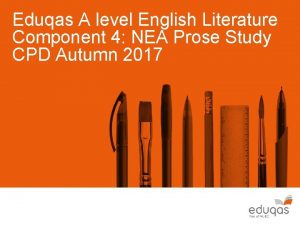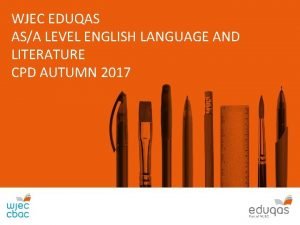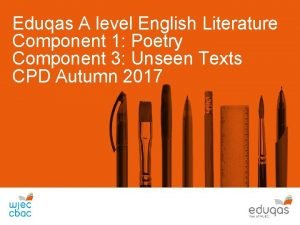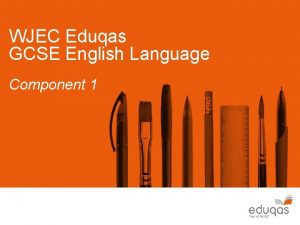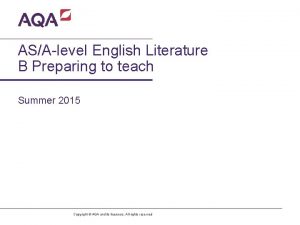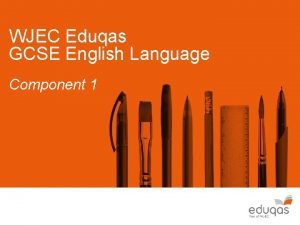Eduqas A level English Literature Component 1 Poetry











- Slides: 11

Eduqas A level English Literature Component 1: Poetry Component 3: Unseen Texts CPD Autumn 2017

A level Component 1: Key Features Section A (i) Directed response to poem or extract (ii)Essay shaped by specific references to contexts and critical views

A level Component 1: Section A (i) Typical points of focus: • • • How is the reader’s response shaped? Presentation of powerful emotions/feelings Presentation of a relationship Presentation of a specific character Creation of mood/atmosphere

Overview • Economical • Relevant • Grasps the “arc” of the poem/extract • Includes brief support

Component 1 (Section A) Component 3 (Section B) Common Skills • Creative engagement, academic register, organisation, terminology • Critical analysis of language and technique, relevant support, address implicit meaning. Different Skills • Component 1: shape response according to specific requirements of task • Component 3: free response; learner decides on the direction, structure and emphasis What are the implications for teaching?

Section A (ii): Context (AO 3) and Different Interpretations (AO 5) DO: • identify the contextual focus in the question • select poems or extracts which will allow consideration of that particular context • make writing about context emerge from and support critical analysis of the text • consider the validity and implications of the view expressed in the question • make a plan which keeps the critical view in play throughout.

Section A (ii): Context (AO 3) and Different Interpretations (AO 5) DON’T: • make context the main focus or include irrelevant material • include pre-learned critical comments which do not contribute relevantly to the consideration of the view expressed in the question.

Component 3 Section A: Prose • Take careful note of AO weightings • AO 3 and AO 5 – each worth 1/5 th of available marks • The extracts must be addressed (see rubric) • Pre-learned contextual and critical materials worth only a portion of 1/5 th of total allowance for each of AO 3 and AO 5 • Conclusions? How should we advise candidates?

Teaching Approaches to period study 18801910 and 1919 -1939 • Begin with samples of literary works • Familiarise students with narrative techniques; characterisation; plot structure; devices such as free indirect discourse and narrative perspectives • When this is secure, introduce some brief contextualising material and critical views • Sheaves of historical/political/cultural notes on context can leave learners with the wrong impression and could encourage an unbalanced approach

Component 3 Section B: Poetry • Candidates take responsibility for their approach (Contrast with Component 1 Section A) • Careful reading and re-reading is the only route to a convincing overview ( showing engagement and understanding) • Line by line, word by word will not facilitate creative engagement / insight • Attention to form and structure must lead to a point about meaning • Writing on context or different interpretations cannot be rewarded and will waste time • Candidates must learn the difference between discussing ambiguity/layers of meaning (AO 2) and suggesting different interpretations (AO 5)

Any Questions? Contact our specialist Subject Officers and administrative team for your subject with any queries. email: gce@eduqas. co. uk Twitter: @Eduqas_English Website: www. eduqas. co. uk
 Yesterday by patricia pogson annotated
Yesterday by patricia pogson annotated Wjec a level english literature past papers
Wjec a level english literature past papers Eduqas a level english language
Eduqas a level english language Midwinter grahame davies
Midwinter grahame davies English language a level nea ideas
English language a level nea ideas Eduqas a level english literature
Eduqas a level english literature Eduqas english literature a level
Eduqas english literature a level Eduqas a level english literature
Eduqas a level english literature Eduqas english language component 2 past papers
Eduqas english language component 2 past papers Eduqas narrative writing titles
Eduqas narrative writing titles Social and political protest writing examples
Social and political protest writing examples Yesterday by patricia pogson analysis
Yesterday by patricia pogson analysis


